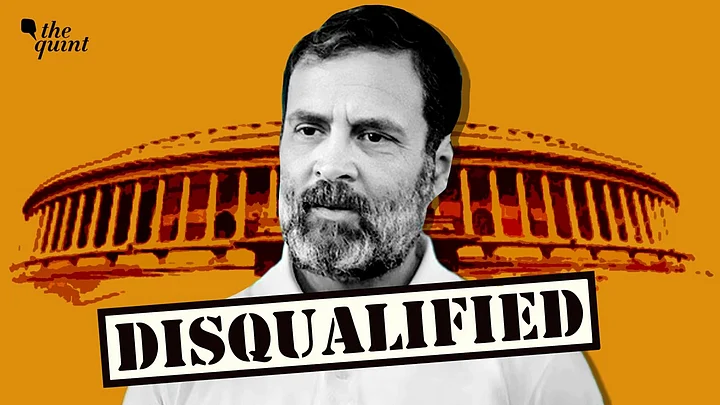On 23 March, a Magistrate’s court in Surat convicted Rahul Gandhi of defamation. He was sentenced to the maximum permissible punishment of two years in prison but the sentence was suspended for a month to allow an appeal. On the very next day, the Lok Sabha Secretariat notified Gandhi’s disqualification. Even though the court suspended the sentence for a period of 30 days, enabling Gandhi to file an appeal, a mere conviction was deemed sufficient to attract the disqualification under section 8(3) of the Representation of People Act, 1951 (RPA).
The merits of Gandhi’s conviction aside, was the Lok Sabha Secretariat justified in disqualifying him from the Lok Sabha in this instance?
Under Section 8 of the RPA, which deals with disqualification due to conviction, two separate kinds of offences are envisaged. The first kind is where mere conviction is enough to attract disqualification, such as any offence under the Prevention of Corruption Act, 1988.
The second kind is where conviction results in a sentence of not less than two years. For the second kind, it is the length of the sentence and not a mere conviction that becomes a ground for disqualification.
If Gandhi had, therefore, received a sentence of less than two years after the conviction, there would be no grounds for disqualification. Yet, if the sentence itself has been suspended by the trial court, would there still be grounds for disqualification? Keeping in mind that Lakshadweep MP PP Mohammed Faizal’s disqualification was revoked by the Lok Sabha after his conviction for murder was stayed by the Kerala High Court, we argue that the same principle should apply to Gandhi’s case well.
Power to Stay Conviction & Execution of a Sentence
Courts are empowered under the Code of Criminal Procedure (CrPC) to stay a conviction and sentence or just the sentence alone. This can be done by the trial court or the appellate court. In addition, the High Court may also exercise its power under Section 482 of the CrPC for the aforementioned stay orders.
Once the stay on conviction is granted, not only is the conviction suspended, even its legal consequences are stayed with immediate effect.
With respect to the Companies Act, 1956, the Supreme Court clarified that a stay on conviction or sentence would also imply a stay on the legal consequences of such a disqualification, such as disqualification from being appointed as a managing director of a company under section 247 of that law. The apex court also reiterated that if the legal consequence of a conviction was irreversible in any way, it should then move to stay the conviction pending hearing the appeal.
Effect of a Stay in Election cases
This principle of a stay being necessary where irreversible legal consequences might follow from a conviction has been applied in election disqualification cases as well.
In Navjot Singh Sidhu’s case (2007), the Supreme Court exercised this power while hearing Sidhu’s appeal against conviction by the Punjab & Haryana High Court. The High Court had reversed the trial court decision and convicted him (then an MP) in a case of culpable homicide not amounting to murder. Noting that Sidhu had voluntarily resigned from Parliament following his conviction, the Supreme Court decided to suspend his conviction, paving the way for him to recontest the bypolls from the Amritsar Lok Sabha constituency.
In Ravikant Patil's case, the Supreme Court had reiterated that even a stay on conviction was enough to lift the disqualification under the RPA and it was not necessary that the candidate had to be acquitted for it.
Even while striking down the three month delay in disqualification under the RPA for sitting MPs and MLAs, the Supreme Court in Lily Thomas v. U.O.I (2013 SC) pointed out that a disqualification for conviction could always be lifted if a court stayed the conviction. In fact, it expressly referred to the Ravikant Patil case while formulating its conclusion.
When it was pointed out that the Lily Thomas judgement might prejudice an MP or MLA convicted on frivolous grounds, the SC further clarified in Lok Prahari v. Election Commission of India (2018) that the power of the appellate court to stay a conviction is a sufficient check on the possibility of such abuses by the ruling party.
On Rahul Gandhi’s Unlawful Disqualification
With the position of the law so clear, one wonders on what basis did the Lok Sabha Secretariat disqualify Rahul Gandhi. More so because he didn’t even need to go to the appellate court seeking a stay since the trial court itself had stayed the sentence. Keep in mind that criminal defamation is not one of those offences where conviction results in automatic disqualification.
If the two-year sentence in this case is the basis for the conviction and if that sentence had been stayed by the trial court, there was clearly no legal basis under the RPA for the Lok Sabha Secretariat to disqualify Gandhi as an MP.
That the disqualification stands on shaky legal ground seems to have finally sunk in at the Secretariat given the reinstatement of Lakshadweep MP PP Faizal. Hours before the challenge to Faizal’s disqualification was due to be taken up by the SC, the Secretariat lifted it on its own accord.
Even though Gandhi’s legal team is preparing to file an appeal in the Sessions Court in Surat by the end of the week, the Secretariat, following its own logic in Faizal’s case, should reverse Gandhi’s disqualification without much delay.
(Alok Prasanna Kumar is a Senior Resident Fellow at the Vidhi Centre for Legal Policy in Bengaluru. He is also a member of the Executive Committee of the Campaign for Judicial Accountability and Reforms.
Naveed Ahmed is a Senior Resident Fellow at the Vidhi Centre for Legal Policy. He works on areas of criminal justice.
This is an opinion piece, and the views expressed are the author’s own. The Quint neither endorses nor is responsible for them.)
